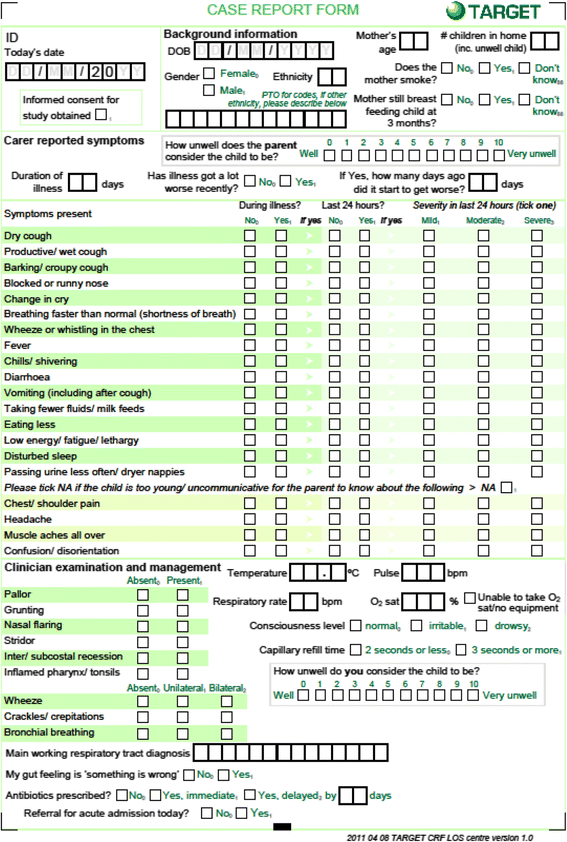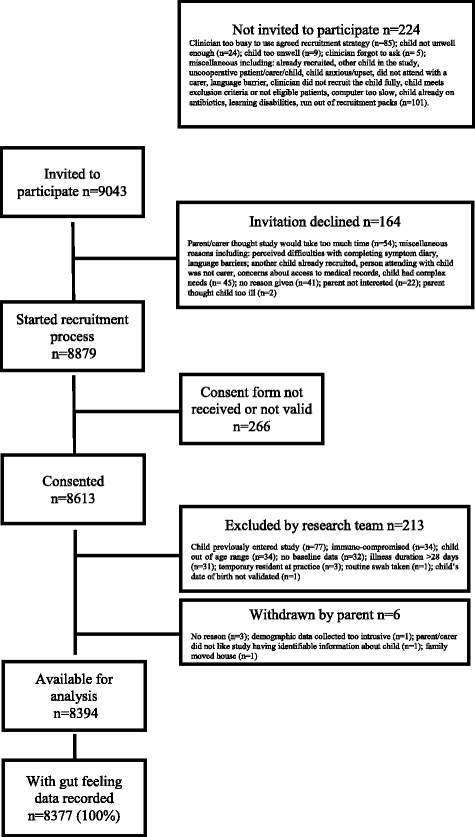What gives rise to clinician gut feeling, its influence on management decisions and its prognostic value for children with RTI in primary care: a prospective cohort study
- PMID: 29402235
- PMCID: PMC5800050
- DOI: 10.1186/s12875-018-0716-7
What gives rise to clinician gut feeling, its influence on management decisions and its prognostic value for children with RTI in primary care: a prospective cohort study
Abstract
Background: The objectives were to identify 1) the clinician and child characteristics associated with; 2) clinical management decisions following from, and; 3) the prognostic value of; a clinician's 'gut feeling something is wrong' for children presenting to primary care with acute cough and respiratory tract infection (RTI).
Methods: Multicentre prospective cohort study where 518 primary care clinicians across 244 general practices in England assessed 8394 children aged ≥3 months and < 16 years for acute cough and RTI. The main outcome measures were: Self-reported clinician 'gut feeling'; clinician management decisions (antibiotic prescribing, referral for acute admission); and child's prognosis (reconsultation with evidence of illness deterioration, hospital admission in the 30 days following recruitment).
Results: Clinician years since qualification, parent reported symptoms (illness severity score ≥ 7/10, severe fever < 24 h, low energy, shortness of breath) and clinical examination findings (crackles/ crepitations on chest auscultation, recession, pallor, bronchial breathing, wheeze, temperature ≥ 37.8 °C, tachypnoea and inflamed pharynx) independently contributed towards a clinician 'gut feeling that something was wrong'. 'Gut feeling' was independently associated with increased antibiotic prescribing and referral for secondary care assessment. After adjustment for other associated factors, gut feeling was not associated with reconsultations or hospital admissions.
Conclusions: Clinicians were more likely to report a gut feeling something is wrong, when they were more experienced or when children were more unwell. Gut feeling is independently and strongly associated with antibiotic prescribing and referral to secondary care, but not with two indicators of poor child health.
Keywords: Child; Cough; Decision making; Emotions; Paediatric; Primary health care; Prognosis; Respiratory tract infections.
Conflict of interest statement
Ethics approval and consent to participate
The study was approved by the South West Central Bristol Research Ethics Committee, UK (reference number: 10/H0102/54) and research governance approvals were obtained for all areas prior to the start of recruitment. The study was sponsored by the University of Bristol, which ensured the study met all regulatory approvals. All participants’ parent or legal carers gave written, informed consent on behalf of the child. All children aged 11 and over gave informed assent.
Consent for publication
Not applicable.
Competing interests
The authors declare that they have no competing interests.
Publisher’s Note
Springer Nature remains neutral with regard to jurisdictional claims in published maps and institutional affiliations.
Figures
References
-
- Okkes IM, Oskam SK, Lamberts H. The probability of specific diagnoses for patients presenting with common symptoms to Dutch family physicians. J Fam Pract. 2002;51(1):31–36. - PubMed
-
- Hay AD, Redmond NM, Turnbull S, Christensen H, Thornton H, Little P, Thompson M, Delaney B, Lovering AM, Muir P, et al. Development and internal validation of a clinical rule to improve antibiotic use in children presenting to primary care with acute respiratory tract infection and cough: a prognostic cohort study. Lancet Respir Med. 2016;11:902–10. doi: 10.1016/S2213-2600(16)30223-5. - DOI - PMC - PubMed
Publication types
MeSH terms
Substances
Grants and funding
LinkOut - more resources
Full Text Sources
Other Literature Sources
Medical



